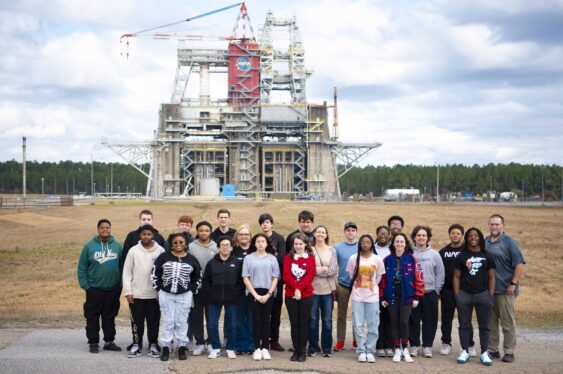By Bo Black at NASA’s Stennis Space Center, with assistance from students at Pascagoula (Mississippi) High School, Hancock County (Mississippi) Career Technical Center, and Springfield (Louisiana) High School
The questions kept coming, exceeding the allotted time, as students at NASA’s Next Gen STEM event in late February explored the importance of computer science for future agency missions.
Students, both in-person and joining in online, interacted with a panel of employees from NASA’s Stennis Space Center near Bay St. Louis, Mississippi, during the agency event about opportunities in science, technology, engineering, and mathematics (STEM).
“We know from our own experience and research that stories are powerful,” NEXT GEN STEM Project Manager Dr. Carrie Olsen said in welcoming students to the event. “It is a big part of our project to connect students to our NASA people because then you can hear their stories. Stories do way more than reading something because you are connecting to another human being, and you may see a bit of yourself in them, and it might spark something.”
Students in classrooms today are part of the Artemis Generation that will contribute to future Artemis missions and every area of NASA work for the benefit of all. As the agency establishes the foundation for long-term scientific exploration at the Moon and prepares for journeys to Mars, it will take all types of roles in STEM, and other fields, to meet needs of the future.
During the February event, NASA Stennis employees working in the fields of engineering, autonomous systems, and cybersecurity sparked the curiosity of students joining in person from Louisiana and Mississippi, as well as those online.
“Computer science is very versatile,” NASA controls engineer Dewayne Lavigne said. “You can go anywhere with a computer science degree, and you are going to be able to find work and have it take you to places you did not know you could go. I never saw myself working at NASA, and here I am.”
Lavigne works with a programmable logic controller in the NASA Stennis test complex. The powerful computer performs its routine functions about 4,000 times a second during propulsion test activities, he said.
During a question-and-answer period following panel presentations, Springfield (Louisiana) High School student Seth Spiers learned from NASA Stennis mechanical engineer Armando Delgado that a typical day can include in-office work with computer software and hands-on field work in support of propulsion testing, which relies on computerized systems to perform complex tasks.
Pascagoula (Mississippi) High School student Josh Davis received feedback from the panel about technical advancements needed for future space exploration.
“A lot of projects are focused on what technologies we need to mature or develop to get astronauts from the Moon to Mars – systems health management, monitoring the health of the different components of the rocket, the propulsion, where the fire comes out, the habitat, anything in between,” said Travis Martin, technical project manager of the NASA Stennis Autonomous Systems Laboratory. “We definitely need to automate those things so the astronauts can carry on the business of conducting science.”
Everyone can find their place in space and NASA, Stennis Chief Information Security Officer Bonita Oliver said, noting that it ultimately depends on what a student wants to do and what a student likes to do. For Oliver, math and science interested her, so she pursued computer engineering. She began at NASA as an application developer manager and now oversees cybersecurity at NASA Stennis.
Students asked a range of questions, from the impact of artificial intelligence to the best path to a NASA career to what motivates panelists in their day-to-day work. Panelists urged students to take advantage of opportunities to participate in NASA activities and programs.
In a group discussion following the event, students from Springfield High School, Hancock County (Mississippi) Career Technical Center, and Pascagoula High School agreed “the future is computer science,” calling it a foundational piece to spaceflight moving forward.
The immersive event, coordinated through NASA Connects in partnership with the Next Gen STEM project through NASA’s Office of STEM Engagement, plays a critical role in helping to build a diverse future workforce by engaging students in authentic learning experiences with NASA’s people, content, and facilities.
https://www.nasa.gov/image-article/artemis-generation-students-inspired-during-nasa-stem-event/













